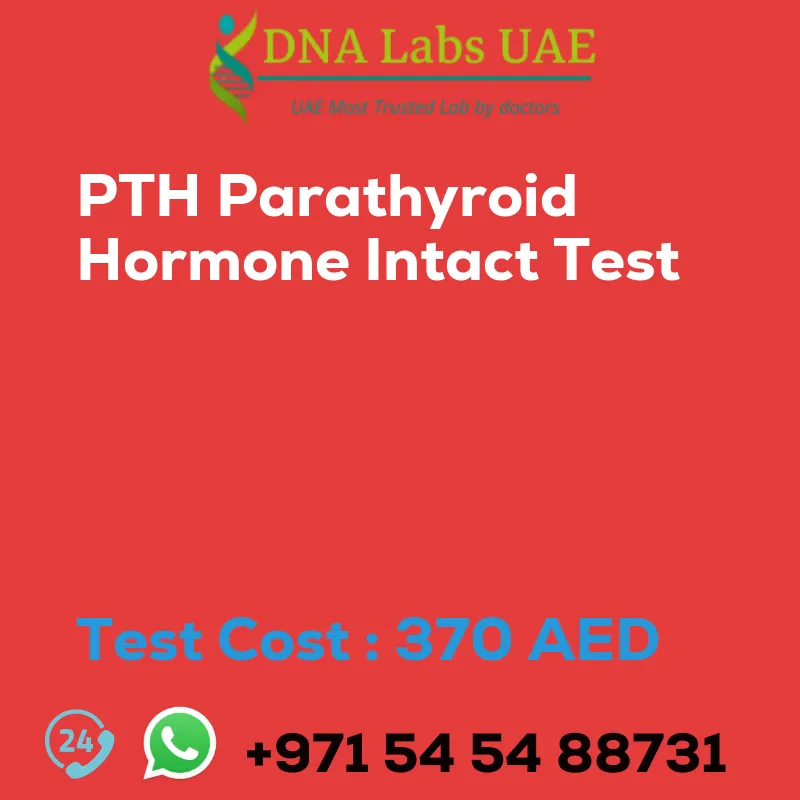PTH Parathyroid Hormone Intact Test Price 370 AED
Test Name:
PTH PARATHYROID HORMONE INTACT Test
Components:
Parathyroid hormone
Price:
370.0 AED
Sample Condition:
3 mL (1.5 mL min.) serum from 1 SST drawn between 8-10am in a fasting condition. Allow blood to clot. Separate serum and freeze within 30 minutes. Ship frozen. DO NOT THAW. Hemolysed samples not acceptable.
Report Delivery:
Daily
Method:
CLIA
Test Type:
Disorders of Bone
Doctor:
Endocrinologist, Othopedician
Test Department:
THYROID & HORMONES
Pre Test Information:
Fasting sample to be given between 8-10 am.
Test Details:
The PTH (parathyroid hormone) intact test is a blood test that measures the level of parathyroid hormone in the body. Parathyroid hormone is produced by the parathyroid glands, which are located in the neck. This hormone helps regulate the levels of calcium and phosphorus in the blood.
The PTH intact test is primarily used to evaluate and diagnose disorders of calcium metabolism, such as hyperparathyroidism and hypoparathyroidism. Hyperparathyroidism is a condition in which the parathyroid glands produce too much PTH, leading to high levels of calcium in the blood. Hypoparathyroidism, on the other hand, is a condition in which the parathyroid glands produce too little PTH, resulting in low levels of calcium in the blood.
The PTH intact test is also used to monitor the effectiveness of treatment for these conditions and to determine the cause of abnormal calcium levels. It may be ordered along with other tests, such as a calcium test and a vitamin D test, to provide a more comprehensive evaluation of calcium metabolism.
The test involves drawing a blood sample from a vein, usually in the arm. It is important to follow any fasting or other preparation instructions provided by the healthcare provider before the test. The blood sample is then sent to a laboratory for analysis, and the results are typically available within a few days.
Abnormal results of the PTH intact test may indicate a parathyroid disorder, kidney disease, vitamin D deficiency, or other conditions affecting calcium metabolism. Further testing and evaluation may be necessary to determine the underlying cause of the abnormal results. Treatment options will depend on the specific diagnosis and may include medication, surgery, or other interventions to restore normal calcium levels in the body.
| Test Name | PTH PARATHYROID HORMONE INTACT Test |
|---|---|
| Components | |
| Price | 370.0 AED |
| Sample Condition | 3 mL (1.5 mL min.) serum from 1 SST drawnbetween8-10am in a fasting condition.Allowbloodtoclot.Separate serumandfreezewithin30minutes. Shipfrozen.DONOT THAW. Hemolysedsamplesnotacceptable. |
| Report Delivery | Daily |
| Method | CLIA |
| Test type | Disorders of Bone |
| Doctor | Endocrinologist, Othopedician |
| Test Department: | THYROID & HORMONES |
| Pre Test Information | Fasting sample to be givenbetween 8-10 am. |
| Test Details | The PTH (parathyroid hormone) intact test is a blood test that measures the level of parathyroid hormone in the body. Parathyroid hormone is produced by the parathyroid glands, which are located in the neck. This hormone helps regulate the levels of calcium and phosphorus in the blood. The PTH intact test is primarily used to evaluate and diagnose disorders of calcium metabolism, such as hyperparathyroidism and hypoparathyroidism. Hyperparathyroidism is a condition in which the parathyroid glands produce too much PTH, leading to high levels of calcium in the blood. Hypoparathyroidism, on the other hand, is a condition in which the parathyroid glands produce too little PTH, resulting in low levels of calcium in the blood. The PTH intact test is also used to monitor the effectiveness of treatment for these conditions and to determine the cause of abnormal calcium levels. It may be ordered along with other tests, such as a calcium test and a vitamin D test, to provide a more comprehensive evaluation of calcium metabolism. The test involves drawing a blood sample from a vein, usually in the arm. It is important to follow any fasting or other preparation instructions provided by the healthcare provider before the test. The blood sample is then sent to a laboratory for analysis, and the results are typically available within a few days. Abnormal results of the PTH intact test may indicate a parathyroid disorder, kidney disease, vitamin D deficiency, or other conditions affecting calcium metabolism. Further testing and evaluation may be necessary to determine the underlying cause of the abnormal results. Treatment options will depend on the specific diagnosis and may include medication, surgery, or other interventions to restore normal calcium levels in the body. |






